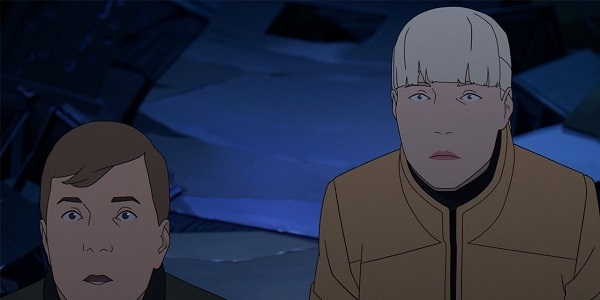
Animation is a complex process where it can be easy for something to get along the way. For crafting a stylish sci-fi neo-noir, it would be easy for Mars Express to get lost within the safe zone of lofty themes about tech and humanity. But it never feels like this intricate world and complex plot overshadow the heart and soul of a film like this. Familiar questions of a robot questioning what it means to be human means little unless we care about who is saying it and why they genuinely want that answer.
source: GKids
Mars Express finds the right words and plucks the precise emotional heartstrings to make such a film more meaningful.
Of Androids and Mars
A futuristic Mars is the setting for mysterious murders amid a colony surrounded by tech and embroiled in a human versus robot civil war. The hardened human detective Aline Ruby (Léa Drucker) and the human-turned-android Carlos Rivera (Daniel Njo Lobé) are investigating the case. They track down androids to break free of human control and become masters of their destiny. The controversial fight for co-existence leads to androids aligning themselves with code-breaking hackers, like the chipper and rebellious Roberta Williams (Marie Bouvet).
source: GKids
The android-inhabited depiction of Mars feels like a fully realized world, from the hologram interfaces of security camera footage to cybernetic sobriety functions. Thankfully, the film doesn’t rely on the details to be the draw for this mystery plot. There’s a great sense of cleverness to amping up the tension through the automated routines of this world. One of the most exciting scenes features Aline and Carlos getting into a car crash caused by assassins. Safety measures for these futuristic cars include a protective foam that is promptly removed by traffic robots during an accident. While Aline and Carlos wait to be freed, assassins wait in the background, evoking excellent tension to find out who will fire first.
Tech-Skilled Buddy Cops
This type of story is not new for science fiction, but it’s appealing in the same way that a romantic comedy inspires despite repeating the same formula. It’s no major shock to spoil that the masterminding behind these murders has to do with a corporate scheme and a code that will manipulate all androids. What is more intriguing is the personal conflicts of the central characters amid this tech-gone-wrong investigation.
Ruby is not posed as some highly stoic detective who keeps her emotions bottled to fight off an existential crisis. She has a drinking problem and retreats to the bottle when at her lowest, revealing a very sloppy drunk in contrast to her hard-nosed nature when sober. Her weaker moments reveal much of her humanity, even when chastised for her behavior. Even in the future, with all its advancements and warnings about drinking, someone as tough as Ruby still finds herself seeking the booze-fueled comfort to handle her problems.
source: GKids
Carlos is granted even more depth as an android who was once human and grapples with his new identity. With his wife and child leaving him for another man, he carries on with bitterness in his mechanical heart. Carlos isn’t some cold being struggling to reconnect with his humanity. He’s angry about the life he has lost and the memories he is struggling to recover. Having his humanity dangled in front of him while being forced into an existence of questionable autonomy is frightening. The direction does not relent on the dread, where there are beautifully sad moments of Carlos wanting to cry for his plight but being unable to do so with a hologram for a face.
The Detailed Future
The animation for Mars Express is some of the most stylish and immersive usage of cel-shaded computer animation. It has the look and feel of picking up a comic book, matching the storytelling of a similar segment in Heavy Metal. Director Jérémie Périn finds a boldness in such an extravagant setting, where the look of the characters is as unique as the bright digital sky of a Mars colony. Rarely does the movie slow down long enough to get lost in the visuals, making them part of the atmosphere more than the central allure.
More importantly, the usage of such animation adds to the weirdly intoxicating resolve of such a story. By the end of the film, there’s an unorthodox acceptance of the limitations of life and the desire for something more. There’s a bittersweet conclusion as characters deal with loss and turn towards the stars to find meaning. A lesser film might’ve added some monologue to clarify this point. The stellar visuals of the wonders of space communicate this message loud and clear while looking beautiful and fascinating.
The details also make the action that much more exciting. The world-building element of humans using androids doubles as a black-market deal, leading to some violent situations where androids and people are gunned down in fast-paced, calculative, and intense battles. The weight of human identity feels powerful in these moments, where the loss of life and identity through tech and body feel equally as important.
Conclusion: Mars Express
Mars Express delivers a solid dose of sci-fi noir that packs a bigger punch through its thoughtful animation and script. Where so many other films would go through the typical trope motions, Jérémie Périn’s movie navigates toward deeper waters of finding greater philosophical truths and reflections of technology. While more decadent sci-fi airs on the safe side, this picture plunges into taking risks that are as enticing as the film’s stylish computer animation. Amid a sea of animated films all aiming for that fertile adult market, Mars Express hits the sweet spot for feeling like a fresher take on some old devices.
Mars Express will be released in Digital and Blu-ray formats on June 18, 2024.
Does content like this matter to you?
Become a Member and support film journalism. Unlock access to all of Film Inquiry`s great articles. Join a community of like-minded readers who are passionate about cinema – get access to our private members Network, give back to independent filmmakers, and more.











